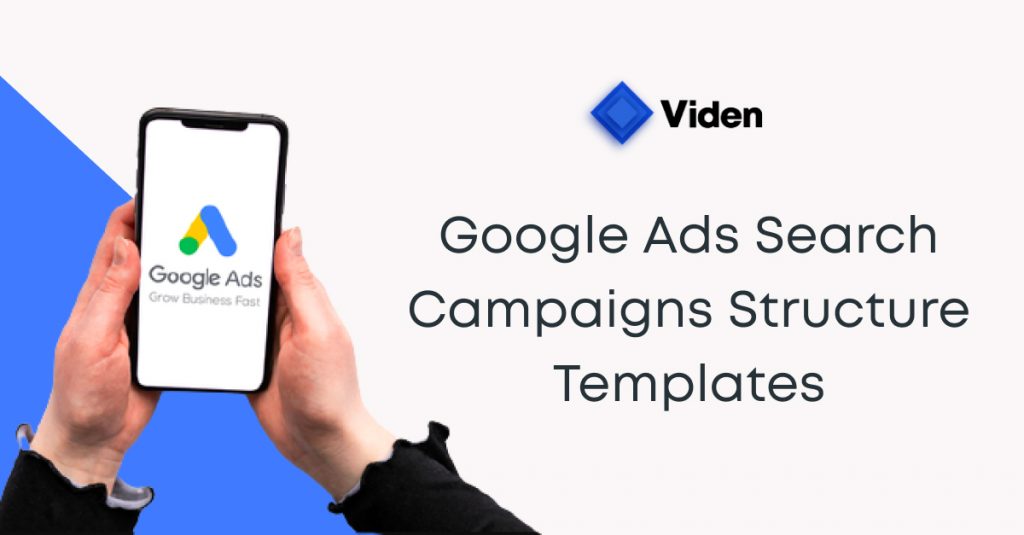How To Structure Your Google Ads Search Campaigns: Google Ads Account Structure Templates

Having a solid account structure is the backbone of a successful account on any advertising platform. It allows you to control when, where, and for which searches you want your ads to appear and how much you spend on different streams of traffic incoming from your marketing campaigns.
With a well-built account structure, you’ll have the following:
- Better quality scores, which means improved results for your ad delivery and lower costs per click/conversion
- A high degree of relevancy between user queries and your ads
- Organized campaigns that are easy to monitor, manage and optimize. With a cluttered or messy structure, it’s easy to overlook certain details and harm your account’s performance
We have created different templates to help you build an organized and successful Google Ads account based on best practices, Google’s recommendations, and insights from our team, with years of experience in the industry.
→ Download Now: Google Ads Account Structure Templates
However, before you dive into all the ways you could structure your account, we’d like to share a few crucial tips and notes to keep in mind before you start working on your Google Ads campaigns:
- There are numerous ways to build and develop your account – there’s no one-size-fits-all solution. Our templates provide examples of campaign divisions based on location, age, keyword match type, etc., and more generalized structures you could use. It’s important to know that separations based on age, location, match type, etc., may limit your data and negatively affect the learning algorithm. And while it’s not impactful for large businesses and accounts, who are working with tons of data on a daily basis, small businesses may benefit from a simpler set-up that focuses on bringing the data together rather than picking it apart (e.g., Theme or Intent-Based Structure). When in doubt, you can always refer to how your website is built and mirror that structure in your Google Ads campaigns.
- Research is a crucial part of building a successful Google Ads marketing strategy. Plan your campaign structure before implementing it in the account: map out the keywords you could use, look up their average costs in the Keyword Planner to make insightful decisions on your bids and budgets, and create a negative keywords list to add to your campaigns; write different versions of your ad copy (you can draw inspiration from customer feedback or see what your competitors are doing) – this way you get a better understanding of your set-up and can easily correct any mistakes, overlaps or discrepancies that may occur.
- When planning your campaigns, it’s always useful to develop a good naming convention for easy navigation throughout your account, reflecting your campaign’s theme and which keywords it contains targeted location or language (if there are several of those), bidding strategy, or any other characteristics that may be relevant.
- It’s important to keep testing. Depending on performance, which tends to change and fluctuate throughout the campaigns’ run, the structure you start out with may need to change along with it. To find what works best for your business, you need to analyze the trends and patterns in your campaigns’ delivery and performance and base your decisions on the data you collect. Don’t be afraid to try different approaches or mix them together if it has the potential to deliver great results for your business.
Google Ads Campaign Planning
Google Ads search campaigns present an incredible opportunity for businesses looking to grow their digital presence and reach potential customers quickly and efficiently. With a well-structured approach, careful targeting, and strategic optimization tactics, businesses can maximize ROI while ensuring that their ads are seen by potential customers who are most likely to convert into paying customers. If done correctly, a successful Google Ads search campaign can be one of the best investments any business makes in its marketing efforts.
If you’re looking to boost your Google Ads performance – feel free to reach out! Our experts will be happy to answer your questions and discuss what steps you can take to maximize your Google Ads results.
Further reading: How to Expand to New Markets Using Google Ads?
Get in touch
Got a question? We'd love to hear from you. Send us a message and we'll respond as soon as possible.
By clicking submit, you agree to our Privacy Policy
Latest Insights
Get the tips from our experts to optimize and scale your campaigns
